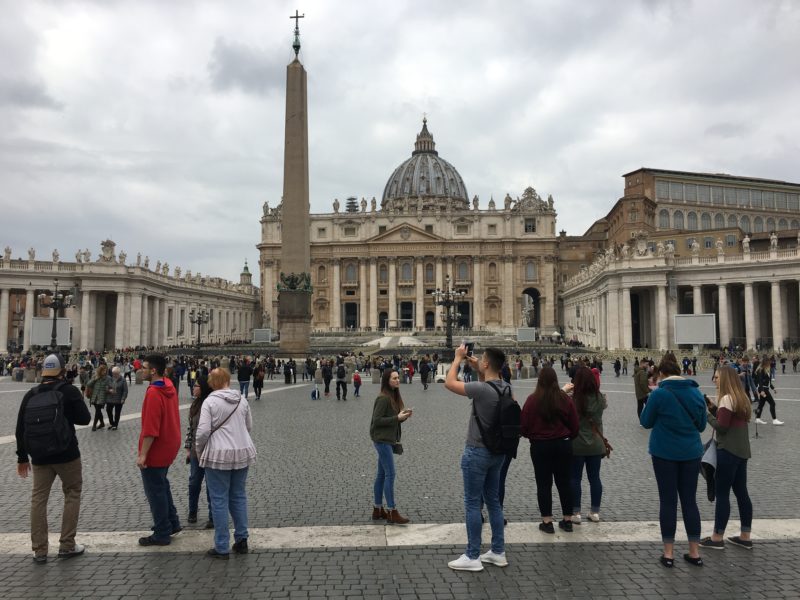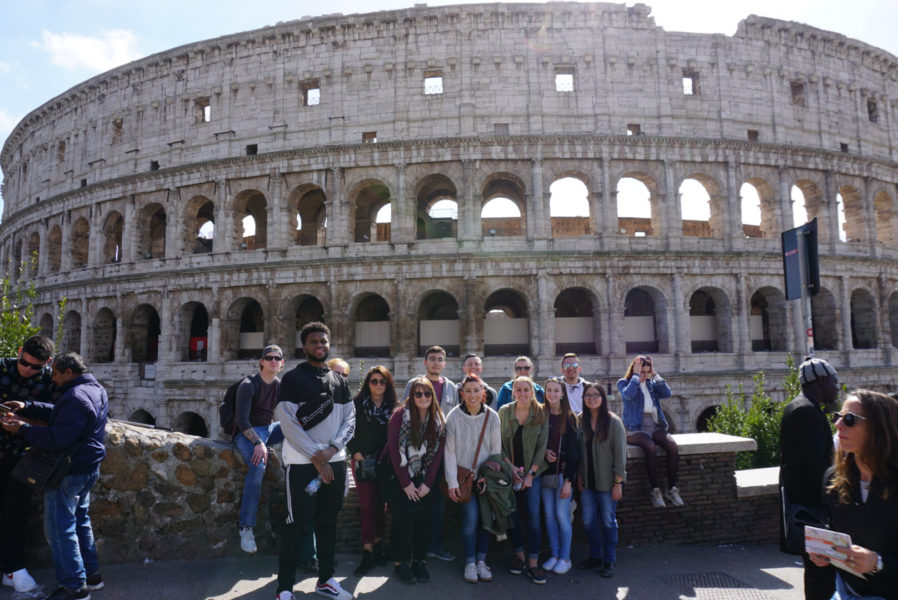
Continuing our series getting to know some of the faculty who have had their programs facilitated by AIFS in recent years, we chat to Dr Aris Karagiorgakis, Assistant Teaching Professor of Psychology at Penn State Fayette. Dr Karagiorgakis traveled with 11 students to Rome for Spring Break 2019, teaching ‘Psychology of Religion”.
Did you study abroad as a student? Do you feel that it has influenced your college experience and/or your career?
I did not study abroad as a student, but I wish I had. As a student, this was one of my biggest regrets. But now, as faculty, I am trying to provide students with the opportunities that I didn’t have. My first experience with AIFS was as a chaperone for another faculty’s class, a History/Geography integrated class on the History of Food and Drink in Italy, during spring break. We traveled to Florence, Bologna, and Parma. That experienced shaped my current involvement with study abroad programs.

What motivated you to bring students abroad?
The benefits of study abroad experiences reach far beyond what can be experienced in the classroom. It isn’t just about learning new material. It is about enhancing students’ global citizenship and perspective of the world outside their own “bubbles”. Experiencing another culture changes the lives of students forever. This was largely the reason I wanted to take on study abroad opportunities.
How did your destination(s) complement your teaching?
What better place to learn about the origins of monotheistic belief than in Rome and the Vatican? We didn’t just read about it, we were transported back in time and immersed ourselves into another culture to learn in a way that can never be duplicated in the classroom.

What is your favorite part about leading students on a customized study abroad program?
Seeing the expression on student faces as they view art, architecture, churches, monuments, sculptures, etc. is just so gratifying to me. The phrase mind-blowing is a little overused, but with these experiences it could not be more accurate. Students have their mind-blown several times a day during a study abroad program. Seeing their faces change as they taste new food or drink, or when they learn something new that connects certain dots for them, makes all the work to provide these experiences all worth it. Seeing students attempt to truly understand how they are standing on a floor (Pantheon) that is 2000 years old, or wrap their heads around how our species was able to build something as big as the Colosseum 2000 years ago is beyond gratifying for me. Their faces run parallel to their brains trying to comprehend their surroundings and what they are experiencing in real time. It is a joy to watch.
Has your experience teaching abroad changed the way you teach back on campus?
Yes, but for me it is more about how I advise students. I am more cognizant to discuss the importance of travel with students – to go a little bit outside your safe bubble, and pursue experiences that are a little bit outside your norm, to meet new people, to see different things, to experience new customs, to taste new foods, and to overall broaden your world and belief system. I talk about global citizenry and the value of exploring and importance of seeing things from different perspectives to truly understand other walks of life. It is a little bit of a challenge because words can’t truly capture the benefits of travel or studying abroad. It is really one of those things you have to do. And when you do, you will want more of it.
Describe a favorite moment or memory of your program.
I don’t think any person visiting the Colosseum for the first time can truly appreciate its scale. I love seeing students trying so hard to wrap their eyes and brains around what they are looking at when they see it for the first time. This experience permanently changed their concept of time, and history, and their concept of our species and what we were capable of achieving 2000 years ago. It changes their view of our species forever.

Was there anything you found challenging about the experience of teaching on a customized program?
The only challenge, at least with American students, is that they are not used to walking.
Any advice for faculty thinking of leading a customized program abroad?
Start this process early, learn from other faculty who have successfully run these programs, and if you ever have the chance to chaperone or shadow another program, do it!
Any advice for students thinking of studying abroad?
Yes. The biggest concern I have heard from hesitant students is almost always about the cost. If you are one of those students, please talk to other students who have studied abroad in some fashion. I have yet to meet a student who said the cost was too much or that they regretted doing it. Never. Not one. Don’t let the cost of these programs get in the way of a life changing experience that you will remember forever. It will change you forever. You cannot put a price tag on this type of experience. Sure, you can always visit Rome or Paris for a vacation, but you will never see or experience it through the academic lens of a study abroad experience. It is a once in a lifetime opportunity.
Where would you like to visit next, either for vacation or for a faculty-led program?
New Zealand!
But more feasibly, I am more likely to end up in either the United Kingdom or Austria (my brother was in Vienna, and Vienna is where Freud got psychology going so it makes sense to visit).
AIFS offers customized faculty-led programs in a wide range of locations worldwide.
